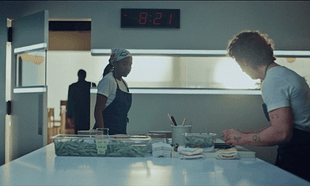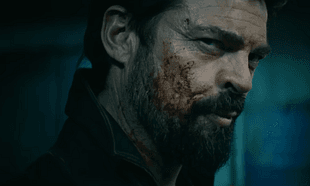Purely from a media content perspective, the dual release of 'Murder in the Cottage' and 'Sophie: A Murder In West Cork' is a fascinating concept.
You have two documentaries, both armed with the same facts, mostly the same interviewees, and the same footage almost - but both have wildly different opinions on what's in front of them. Whereas Jim Sheridan's 'Murder in the Cottage' spent a significant portion of its five episodes embedded with Ian Bailey, the French legal system's legal case, and the fallout from the extradition attempts, Netflix and director John Dower go for something much more clinical and clear.
Ian Bailey is an interview subject, yes, but the documentary keeps him at arm's length and remains aloof with him. Sure, he offers up some of his poetry in a scene or two, but it certainly doesn't have the same uncomfortable intimacy that Sheridan had with him. Not only that, it seems reasonable to assume that Netflix's documentary has a firm idea about Bailey's culpability, not to mention being more understanding about France's legal system compared to Ireland's. Jim Sheridan's documentary, by contrast, seemed to scoff at the very notion of allowing some of the evidence into the French case. Here in 'Sophie: A Murder In West Cork', a lot more evidence in the French case is revealed and brought to the fore that was either neglected or outright ignored in Jim Sheridan's documentary.
The documentary's choice in interviewees is also quite telling. Irish journalists frequently guide the story, with colour from Schull residents - many of whom openly admit to disliking Ian Bailey even before he was the prime suspect and convicted in absentia by the French courts. Sophie Toscan Du Plantier's son, Pierre, is also interviewed, as are her parents. Key witnesses called to the French case are also featured.
Compared to Jim Sheridan, John Dower has much more experience in directing documentaries, especially with those with complex topics and controversial subjects. Dower directed Louis Theroux in 'My Scientology Movie', which was the subject of some controversy here in Ireland back in 2015. The cinematography and the setting for each interview are slick and polished, and the interviewees provide clear context. And while it may be more pointed in its conclusions from the case, there is none of the influence or the deliberate searching that Jim Sheridan's documentary has.
Instead, 'Sophie: A Murder In West Cork' provides for a clear, crisp examination of the relevant facts to the case. The dead-ends, the side-roads, the meanderings and the endless theories are there, but the documentary glides over them and closes them off with finality when they become irrelevant. Others, such as Marie Farrell's testimony and recanting, is covered in detail, but the conclusions are more damning than Sheridan's. Farrell is also not interviewed in this documentary, whereas Sheridan's documentary practically made her a main character.
Because the documentary's conclusions from the case feel more convincing than Jim Sheridan's 'Murder in the Cottage', you could walk away from 'Sophie: A Murder In West Cork' with a clear idea as to what happened, how it happened, and who's responsible. Yet, because there is another documentary that goes into granular detail compared to 'Sophie: A Murder In West Cork' and varies so significantly from this one, you're left just as confused as before. The case is one that has haunted the region for nearly a quarter-century, with no easy answers coming to the fore in that time. The facts are subjective and easy to interpret with different outcomes. It can't be said that one of these documentaries is right and the other is wrong by default.
A documentary can't convict anyone, and though it may advocate for or absolve people, the facts stay the same. A woman died violently and the murderer - whoever they are - is still free.









































































